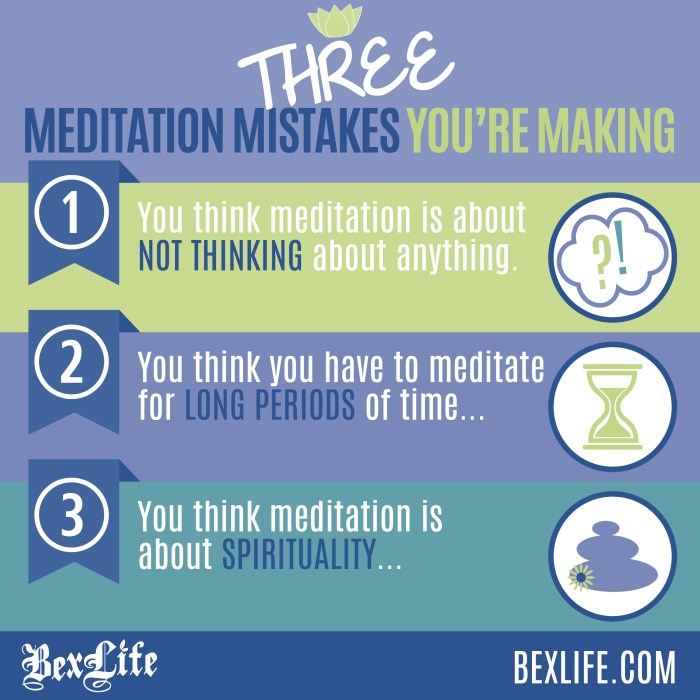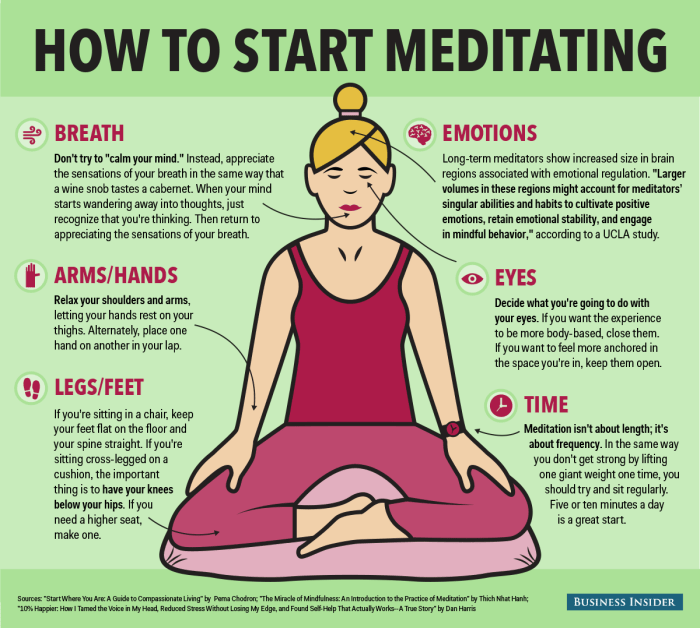Meditation for Beginners introduces the transformative journey towards inner peace and mental clarity, opening doors to a world of mindfulness and self-discovery.
Embark on this adventure as we delve into the fundamental concepts and practices that lay the foundation for a fulfilling meditation experience.
Introduction to Meditation
Meditation is a practice that involves focusing the mind and eliminating distractions to achieve a state of mental clarity, relaxation, and inner peace. For beginners, meditation offers numerous benefits such as reducing stress, improving concentration, enhancing self-awareness, and promoting emotional well-being.
Establishing a regular meditation practice is crucial for beginners to experience the full benefits of this ancient practice. Consistency is key in reaping the rewards of meditation, as regular sessions help to train the mind, build resilience, and cultivate a sense of mindfulness in everyday life.
One common misconception about meditation for beginners is that they need to clear their minds completely. In reality, it is normal for thoughts to arise during meditation. The key is to acknowledge these thoughts without judgment and gently guide the focus back to the breath or chosen point of concentration.
There are various types of meditation suitable for beginners, each offering unique approaches to mindfulness and relaxation. Some examples include:
1. Mindfulness Meditation
- Focuses on being present in the moment and observing thoughts without attachment.
- Involves paying attention to sensations, emotions, and surroundings.
2. Guided Visualization
- Involves imagining peaceful scenes or scenarios guided by a meditation instructor or recording.
- Helps in reducing stress and promoting relaxation through visualization techniques.
3. Loving-Kindness Meditation, Meditation for Beginners
- Focuses on cultivating feelings of compassion and goodwill towards oneself and others.
- Involves repeating phrases of loving-kindness and sending positive intentions to all beings.
Setting Up a Meditation Space

Creating a serene and comfortable environment is crucial for a successful meditation practice. Your meditation space should be a place where you can relax, focus, and let go of distractions.
Choosing the Right Location
When selecting a location for your meditation space, opt for a quiet area with minimal foot traffic. Choose a spot with natural light if possible, as it can help create a calming atmosphere. Avoid areas near electronics or loud noises to minimize distractions.
Essential Items for Your Space
- Comfortable cushion or mat to sit on
- Aromatherapy diffuser with calming essential oils
- Soothing background music or white noise machine
- Inspirational or meaningful decor such as candles, crystals, or plants
Enhancing the Ambiance
To enhance your meditation experience, consider incorporating elements like soft lighting, such as candles or string lights, to create a warm and inviting atmosphere. Experiment with calming scents like lavender or sandalwood to promote relaxation. Personalize your space with items that hold significance to you, such as spiritual symbols or artwork that inspires tranquility.
Basic Meditation Techniques

Meditation is all about finding a sense of calm and focus in the present moment. Here are some basic techniques to help beginners get started:
Simple Breathing Exercises
Breathing exercises are a great way to anchor your focus and relax during meditation. Start by sitting comfortably with your eyes closed. Take slow, deep breaths in through your nose, allowing your belly to rise, and exhale slowly through your mouth. Repeat this process, focusing on the sensation of your breath as it enters and leaves your body.
Mindfulness Practice
Mindfulness is the practice of being fully present and aware of your thoughts, feelings, and surroundings without judgment. During meditation, you can cultivate mindfulness by simply observing your thoughts as they come and go, without getting caught up in them. Focus on the present moment and let go of any distractions.
Body Scan Meditation
Body scan meditation involves systematically focusing on different parts of your body, from head to toe, and noticing any sensations or tension present. Start by bringing your attention to your feet and slowly work your way up through your legs, torso, arms, and head. This practice can help you release physical tension and become more aware of your body.
Starting a Basic Meditation Session
To start a basic meditation session, find a quiet and comfortable space where you won’t be disturbed. Sit or lie down in a relaxed position, close your eyes, and focus on your breath or a specific object. Set a timer for your desired meditation length, whether it’s 5 minutes or 20 minutes, and gently bring your attention back whenever your mind wanders. Remember, the key is to be patient and kind to yourself as you develop your meditation practice.
Overcoming Common Challenges: Meditation For Beginners
Starting a meditation practice can come with its own set of challenges for beginners. It’s important to acknowledge these obstacles and have strategies in place to overcome them.
Distractions During Meditation
- A common challenge for beginners is dealing with distractions during meditation. It’s normal for random thoughts to pop up, but it’s essential to acknowledge them without judgment and gently redirect your focus back to your breath or mantra.
- Try practicing mindfulness by observing your thoughts without getting attached to them. This can help you create distance from distractions and bring your attention back to the present moment.
- Consider using guided meditation apps or music to help drown out external distractions and create a more conducive environment for meditation.
Staying Motivated and Consistent
- Consistency is key when it comes to establishing a meditation practice. Set a specific time each day for meditation to make it a habit.
- Find a meditation technique that resonates with you and brings you joy. Experiment with different styles until you find what works best for you.
- Join a meditation group or community for support and accountability. Sharing your experiences with others can help you stay motivated on your meditation journey.
Managing Expectations and Frustrations
- It’s common to feel frustrated or discouraged in the initial stages of meditation practice. Remember that progress takes time, and it’s okay to have off days.
- Practice self-compassion and be patient with yourself. Allow yourself to experience the present moment fully, without placing unrealistic expectations on your meditation practice.
- Focus on the process of meditation rather than the outcomes. Embrace the journey and trust that with time and dedication, you will experience the benefits of a consistent meditation practice.